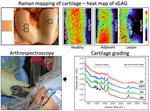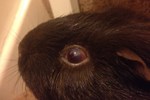Search - Research
391 - 400 of 413 results
-
Computer simulations reveal dinosaurs wagged their tails when running
Scientists from the Royal Veterinary College discover that dinosaurs, like Tyrannosaurus and Velociraptor, wagged their tails when running, similar to how humans swing their arms when moving. -
New research reveals potential for earlier detection of cartilage degeneration in osteoarthritis
New research reveals potential for earlier detection of cartilage degeneration in osteoarthritisResearch, led by the RVC, marks an important milestone in detection of molecular changes that mark …
-
Improving antimicrobial stewardship: RVC research reveals extent of systemic antimicrobial usage in UK equine practice
To mark World Antimicrobial Awareness Week, the Royal Veterinary College (RVC) has released new research using real-world antimicrobial prescription data to investigate the use of systemic antimicrobials in UK equine practice. The research, which is …To mark World Antimicrobial Awareness Week, the Royal Veterinary College (RVC) has released new …
-
FPersian cats at high risk of health problems, study shows
Almost two thirds of Persian cats suffer from at least one health condition according to the largest every study of this breed -
Bad teeth revealed as biggest problem for pet greyhounds
As well as bad teeth, the RVC research revealed that traumatic injuries, overgrown nails and osteoarthritis are also major concerns for pet greyhounds -
Misbehaving dogs die young
New pioneering research conducted by the VetCompass™ Programme at the Royal Veterinary College (RVC) reveals that dogs with undesirable behaviours, such as aggression, running away, fighting, over-excitability or barking, are more likely to die at a younger age. Undesirable behaviours may reflect poor training by owners or even undiagnosed medical conditions, for example dogs that urinate indoors may be suffering from unidentified bladder infections. -
Reconstruction of ancient chromosomes offers insight into mammalian evolution
What if researchers could go back in time 105 million years and accurately sequence the chromosomes of the first placental mammalWhat if researchers could go back in time 105 million years and accurately sequence the chromosomes …
-
A study conducted by the Royal Veterinary College in collaboration with UT Southwestern Medical Center demonstrates the potential of gene editing technology to treat Duchenne muscular dystrophy
A study conducted by the Royal Veterinary College in collaboration with UT Southwestern Medical Center demonstrates the potential of gene editing technology to treat Duchenne muscular dystrophyResearchers at the Royal Veterinary College (RVC), in collaboration with researchers at UT …
-
New research confirms extreme welfare issues in Shar Pei, the sandpaper skin dog breed
New research from the Royal Veterinary College (RVC) has found that in-turned eyelids and ear disorders are the most common health conditions in Shar Pei dogs in the UK; both resulting from the breed’s characteristic loose, thickened and folded skin. … -
New research from the RVC highlights most common disorders in UK pet guinea pigs
New research from the Royal Veterinary College (RVC) has identified the most common conditions in pet guinea pigs in the UK are overgrown nails, ringworm and eye ulcers. Several of these common conditions are linked to sedentary lives in captivity …










